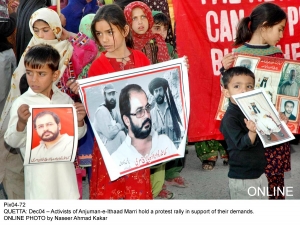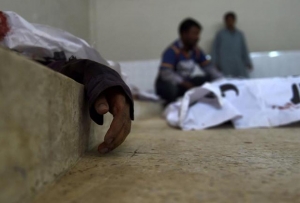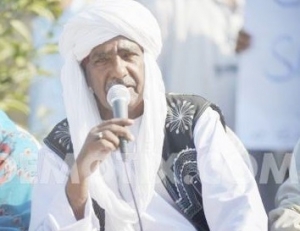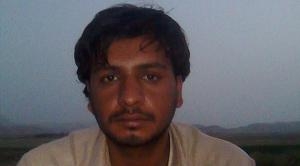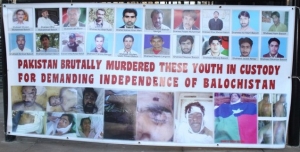By International Voice for Baloch Missing Persons
The Baloch have been resisting the subjugating policies of the occupying nations for the last hundred and seventy years. In their struggle for regaining their sovereignty and national honour, the Baloch has been facing the brutal repressive measures of the occupying states. Their homeland Balochistan is mainly divided into Pakistani and Iranian occupied Balochistan. From the very beginning these two states used their military might and inhuman tactics to suppress the Baloch national struggle for liberation. The situation in Iranian and Pakistani occupied Balochistan for the last many years is grave in a humanitarian perspective. Hundreds of the Baloch have been publicly hanged after summary trials in various parts of Western Balochistan by various Iranian regimes. In Pakistani occupied Balochistan, thousands have been killed in military operations, thousands of the Baloch became homeless, and thousands known and unknown Baloch have been abducted by the security agencies. The fate of these missing persons is still unknown; however, from time to time a number of mutilated bodies have been found in desolate areas and these are the bodies of Baloch enforced disappeared persons, they bodies have been recognised by their families. They had all been reported as abducted by Pakistani security forces.
The Baloch national resistance was the result of occupation of the Baloch state of Khanate of Kalat by the British on 13 November 1839. Following their colonial policy of divide and rule, the British divided Balochistan into three parts under the ‘Goldsmith Line’ agreement in 1871 and Durand Line agreement of 1893. Western Balochistan was handed over to the Qajar Dynasty of Persia, the modern day Iran, Eastern Balochistan was controlled directly by the White Hall and a large segment of the Northern region of Balochistan was given to Afghanistan.
Iranian Occupied Balochistan: The history of abduction, imprisonment, displacement and enforced disappearances in western Balochistan goes back a long way. During Qajar and Pehlavi periods in brutal military campaigns beginning from 1920s many hundreds and thousands of the Baloch people faced the inhuman brutalities. Thousands were killed, many were forced to leave their homeland and many had gone missing. Within two years of its existence the Islamic regime of Ayatollahs has managed to wipe out almost all politically and intellectually conscious section of Baloch society. Many were imprisoned, tortured, executed or are still missing. Hundreds of these people were forced to leave their homeland and seek sanctuary in neighbouring and in some Western countries.
Just to name a few among the long list of the victims we have: Dr. Rahmat Hosainbor (survived assassination attempt 1980), Amin Noraee, a sixteen year student, was killed during the attack of the Islamic revolutionary guards at Sarawan students’ peaceful demonstration (1980), Rahim Zard-kohi killed in a clash with Islamic guards (1980), Ali Reza Rahmani (Arshad), one of very few Baloch educated engineers, was executed (1981) Mohammed Abrahim Ashkan another engineer who was the head of Pishin water reservoir construction was executed in Chabahar (1981), Cheragh Mohamadi, a high school teacher was executed (1981), Abdul Rahim Raieesi, a student of Balochistan University executed (1981) Mohamed Gull Rigi, another student of Balochistan University was killed in Zahidan prison (1981). The teenager political activist, Khosro Mobarki, was executed (1981), Abdul Samad Hosainzahi, a teacher executed in Zhidan (1981), Shafi Mohammad Zeluldini executed (1981), and Akhardad Sopahi and Dr Sdigh Didawar were killed in their homes by the Islamic guards (1981).
The simple comparative statistical data of state violence in Western Balochistan can clearly illustrate the scale of Islamic regime’s brutality against Baloch people. During the period of 2004/2009 the Islamic regime of Iran has executed about 1481 persons, out of the total population of 75 million, according to Amnesty International annual reports on Death Sentences and Executions. In the same period the number of Baloch people being killed by the Islamic regime forces is about 800 persons out of a population of about three million people (Balochistan Human Rights Activists Association). That figure indicates that about 55% of people being killed by Islamic regime of Iran during this period have been from Baloch community. In view of that, as a proportion to their population, the Baloch in Western occupied Balochistan had the highest concentration of death penalties in the world during this period.
The Islamic regime of Iran even does not tolerate Baloch social activists who try to work under their own sanctioned laws. Mr Yaghub Mehrnehad, a young Baloch journalist whose activities were within regime’s legal framework, was the first Web blogger journalist in the world to be executed in August 2008 by Islamic regime of Iran.
Pakistan Occupied Balochistan: Eastern Balochistan in 1947 declared its independence two days before the formal withdrawal of the British and the partition of Indian subcontinent. In August 1947 the first democratic general elections were held in Balochistan. However, eight months later on 27 March 1948 the newly created religious state of Pakistan invaded and occupied the Baloch state. Illegal occupation of Balochistan by the artificial state of Pakistan has been the most devastating period in the entire history of the Baloch and Balochistan. Pakistani state has carried out five major military operations in Balochistan in 1948, 1958, 1962, 1973-77.
The ongoing military assault began in 2000 and is being carried out with all its atrocities and human rights violations. Thousands of the Baloch from Marri and Bugti tribes were forced to leave their homes. Majority of them are still internally displaced and some of them took refuge in various countries. During this ferocious military operation, thousands of the Baloch intellectuals, political workers, students and Baloch leaders were imprisoned, tortured and killed. Even, Pakistani interior minister Aftab Sherpao, in December 2005 had acknowledged the arrest and imprisonment of at least 4000 Baloch political and social activists up to that point. Majority of these people are still missing.
There has been a steady rise in the magnitude of the abduction of the Baloch by Pakistani secret agencies for the last many months. The miseries of the abducted persons known popularly as forced-disappeared have been highlighted by various international humanitarian organizations. The Asian Human Rights Commission, in their report on 5 March 2010, has confirmed this number. In their statement they also included among the victims, 168 children and 148 women. Baloch sources’ estimate of the number of extra judicial abductions and missing Baloch people by Pakistani secret agencies is about 8000 persons.
From the year 2006 Pakistani state security agencies has also launched a systematic campaign of target killing of the Baloch political leaders, Baloch intellectuals and students. In August 2006 the Pakistani army targeted and killed the 80 years old prominent Baloch political leader Nawab Akbar Bugti. He was killed along with unspecified number of his companions by aerial bombardment and according to some sources by chemical weapons.
Three other prominent Baloch political leaders; Baloch National Movement President Ghulam Mohammed Baloch, his deputy Lala Munir Baloch, and Baloch Republican Party Secretary General Sher Mohammed Baloch were abducted by Pakistani agencies from their lawyer’s office on 3 April 2009. Their mutilated bodies were found on the outskirts of Turbat on 8 April 2009. In the same way Pakistani secret agencies abducted, the joint secretary of Baloch National Movement Rasool Bux Mengal, on 23 August 2009. His body was found hanging from a tree on 30 August 2009 in Bela of Lasbela district. On his body his torturers curved; ‘Long Live Pakistan’. Jan Muhammad Dashti, a well known Baloch intellectual, although badly injured, survived the assassination attempt on 23 February 2009. Habib Jalib, the General Secretary of the Balochistan National Party and another prominent leader of the party Haji Liaguat Ali Mengal were assassinated by the death squads of the Pakistani army in July 2010.
From August 2010 the Pakistani intelligence agencies have killed between 40 to 50 Baloch political and social activists and then dumped their bodies on open fields. Among these victims were three lawyers of the Balochistan High Court. Mr Munir Mirwani, Mr Zaman Khan Marri and renowned Baloch Lawyer, columnist and poet, Mr Ali Sher Kurd were abducted during August and September. Munir Mirwani is still missing while the mutilated bodies of other two lawyers were found after some days of their abductions.
The role of Pakistani army in the killings and abduction of 40 Baloch activists has been highlighted by the Amnesty International in its report on 25 October 2010 on Balochistan. From the of publication of this report the Pakistani state and its security agencies have accelerated the enforcement of their policy of enforced disappearances, abduction, arbitrary arrests, torture, killing and dump & kill operations in Balochistan with an alarming pace.
Sami Baloch aged 20 years, a student of Balochistan University of Engineering and Technology and a member Baloch Student Organisation (BSO-Azad) was abducted by Pakistani agencies on 1 October 2010 from Khuzdar. His bullet-riddled body was recovered from Hanari Nullah of Ferozabad on 17 November 2010 in Khuzdar town.
Bashir Ahmad Baloch, a member of BSO-Azad, was abducted during the last week of August 2010 from Mastung district and his bullet riddled body bearing torture marks was found on 17 November 2010 in Mastung town. Asmatullah Baloch, a member of BSO-Azad from Mastung was abducted by personnel of Pakistani paramilitary forces on 22 September and his body was discovered 17 November 2010. Nasrullah Baloch was abducted from Kalat in September 2010 and his body was recovered from Kapotho area of Kalat on the second day of EID festival.
Lala Hammed Baloch was a member of Gwadar Press club and an active member of Baloch National Movement. He was abducted on 23 October 2010 and his body was discovered on 18 November 2010 in Kech Kaur near Hiruk area of Turbat. Pakistani agencies have left a message in his pocket that reads: ‘Eid gift for the Baloch Nation’. The date Lala Hammed body was found was on the second day after one of Islamic Eids (a celebration day). On the same day the body of Hamid Ismail Baloch was found in the same area.
Asmatullah Sarparah Baloch, a member of BSO-Azad and a student of Balochistan University was abducted by Pakistani security services on 22 September 2010 and his mutilated body was recovered on 17 November 2010. Basheer Ahmad Lehri Baloch, a tailor and member of BSO-Azad, was abducted from Mastung Bazaar on 23 August 2010. His body was recovered on 17 November 2010. Zahoor Baloch was also abducted by Pakistani intelligence agencies from Maustung Bazaar on 23 August 2010 and his body was found in Mastung on 21 October 2010.
Asim Karim Baloch was a student of Mulatan Polytechnic College and a member of BSO-Azad. The teenager Asim Karim before being abducted by Pakistani security forces addressed a press conference against the abduction of his brother Tariq Karim Baloch who had been abducted on 26 October 2010. His body was found in Khanozia area on 1 November 2010.
On December 1st 2010, the Pakistani forces assaulted the house of a Baloch notable, Mir Ayub Gichki. They demolished the house by excessive bombardment and killed two of his sons and three other Baloch youth in the broad day light and in front of area notables. The crime of these young people was only one and that was they were very active in the Baloch resistance struggle.
All the above mentioned victims and thousands of other who have been killed by occupying Pakistani and Iranian forces were resisting the illegal occupation of their motherland. They are regarded as heroes of National liberation struggle among Baloch masses. Their burial took place with National pride and honor.
The bodies of all victims, without exception, bear signs of extreme torture and they all have been killed and dumped in open air in the same way in different parts of Balochistan. They all bear the hallmark of professional torturers. The policy of killing and dumping is premeditated, organised and systematic. The victims of this policy are selected from the most politically active and socially conscious section of the Baloch society.
The deliberate silence of International Community: The Baloch are cherishing the noble goal of a liberated united Balochistan. They are struggling against the religious fundamentalist states to liberate their land where they can live with their own traditions and values of a secular, democratic society. In resisting the subjugating maneuvers of the most atrocious colonial states of 21st century they are bearing the full force of the brutalities.
The treatment of the Baloch under occupation of the Islamic fundamentalist regimes of Pakistan and Iran is not much different from other nations who had experienced similar forceful subjugation; however, the irony is that the international community is keeping a blind eye on the systemic annihilation of a whole nation. It is high time that the international community to raise effective voices against these inhuman atrocities being perpetuated. It is high time for the international community to assist the Baloch in their just struggle for basic human rights which include the right to live with honor, dignity and independence.
References:
The statistics about the brutalities of the Pakistani and Iranian states against the Baloch have been taken from different sources. Some of these are listed below:
1. http://www.amnesty.org/en/news-and-updates/pakistan-urged-investigate-murder-and-torture-baloch-activists-2010-10-26 (Amnesty International)
2. http://www.ahrchk.net/statements/mainfile.php/2010statements/2395/ (Asian Human Rights Commission)
3. www.balochwarna.org
4. www.bygwaah.com (Official website of the International Voice for Baloch Missing Persons)
5. www.bhrw.blogspot.com (Balochistan Human Rights Activists Association)
Report Compiled by: International Voice for Baloch Missing Persons (UK) – November 2010

